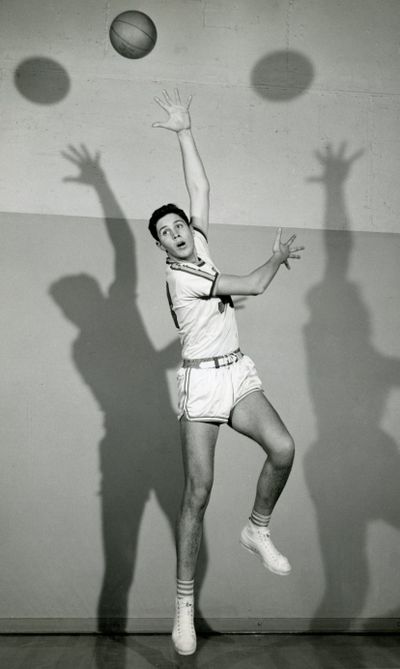A tall tale
GU had 7-1 Trontzos when foreigners weren’t in vogue

The plane landed at Geiger Field about a quarter to 7 on an August evening, and the passengers all smartly ducked their heads exiting through the side door.
Except George Trontzos, who more or less jackknifed out of the aircraft.
In 1959, a teenager who stood 7-foot-1 was quite a sight in Spokane, and doubly mysterious if he appeared out of the blue from someplace on the other side of the globe like, say, Greece.
That’s still true, of course. When someone that big suits up to play basketball at Gonzaga University, it’s cause for all sorts of hubbub, because the arena is forever sold out, every game is on TV and outsized players always come with outsized expectations. The Zags have such a player now in Przemek Karnowski, and his arrival from Poland may as well have been heralded with palace trumpets.
It was a good deal different 53 years ago.
The foreign players that fill up American college rosters now? George Trontzos was foreign before it was cool and still a curiosity.
“Everything is more globalized now,” he said in a phone conversation. “Everybody is the same. Something happens, it’s on the Internet in an hour, all over the world. I think it’s much easier to go play in the USA now.”
Trontzos, now 70, lives in an Athens suburb, retired from the banking industry, which is probably a good thing to be retired from in Greece these days. Time and distance have frayed some of his Gonzaga ties. The coach who greeted him at Geiger that night, Hank Anderson, is dead. Old teammates are scattered, though when Bob Hunt, who played with Trontzos on the 1961 and ’62 Bulldogs, detoured to Athens on a trip years ago, the stop was illuminating.
“I’m in a bar and I ask the bartender if he’s ever heard of George Trontzos,” recalled the Portland saloonkeeper, “and in about 15 minutes they had him down there.”
That’s because Trontzos was a much bigger deal as a player in Greece than he ever was here, 7-1 or not.
“I was 17 years old when I came to Gonzaga,” said Trontzos, “and it wasn’t like I started playing when I was 8 years old. I started at 16.”
But after leaving GU, he would blossom into a star for AEK, champions of Greece’s pro league six times during his time there and the first Greek team to win an international trophy in any sport when it claimed the European Winners Cup in 1968. Trontzos had 24 points against Prague Slavia in the title game, played outdoors in front of 80,000 people at Panathenaic Stadium, site of the first modern Olympics.
He also scored more than 1,500 points in 136 games over 11 years with the Greek national team, serving as captain for four.
His Gonzaga turn was more about self-discovery and even personal courage, pioneer that he was.
Though he wasn’t GU’s first foreign player. When he arrived at school, he inherited a 7 1/2-foot bed that had been procured for Jean Claude Lefebvre, a 7-3 1/4 giant who like Trontzos later had been found for Anderson by former Whitworth coach Jim McGregor, then something of an international hoop gadfly.
Lefebvre stayed just two years – homesick, disappointed with his progress, disenchanted with America.
The son of an army colonel, Trontzos was far more at ease, though he didn’t speak much English when he landed in Spokane with another import, Hans Albertsson of Sweden.
“For the first month or so, with the school not open yet, we sat in a rented place next to the school and watched TV,” Trontzos recalled. “That’s how I improved my English.”
But beyond “Dobie Gillis,” there were also dinners at the homes of Greek families, card games and “Friday night dances, hayrides, things like that,” he said. He even babysat for Hunt and his wife.
Instead of returning to Europe during the summers or playing international ball as players do now, he worked – at a lumber mill in Oregon, surveying in the Nez Perce National Forest, and even at Playfair Race Course, where he was the world’s tallest stable hand.
And he liked the camaraderie of teams that had a mix of older service veterans – Frank Burgess among them – and younger Northwesterners.
“We stayed pretty late at some pub one night and we had a game the next day,” Trontzos recalled. “We won but the coach made us play the whole game – that was our punishment.”
Slender and easily muscled physically and a basketball newbie, Trontzos’ development was fitful. Not until his senior year did he play regularly, averaging not quite six points and eight rebounds a game. A bigger regret is that he left GU in 1963 without graduating.
But he left with something else.
“The most rewarding thing is that I found myself,” he said. “I was ashamed of my height. It was very difficult in Greece, because everybody was looking at you and making jokes, saying things that weren’t very nice to a young boy. It was much better in America. People were nice – not only to me, but to each other.
“Coming to Spokane built my confidence as a man.”